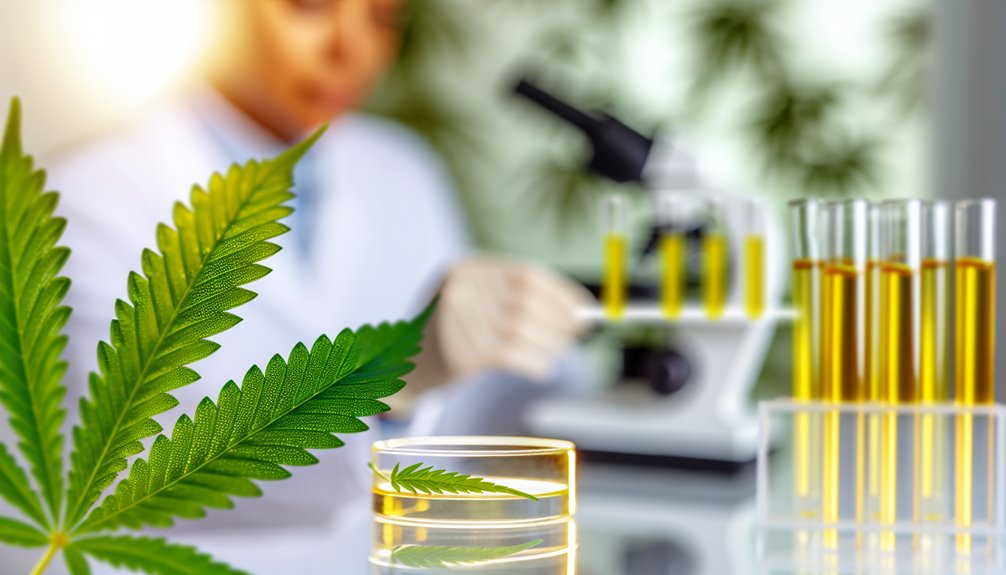You've likely heard about medicinal cannabis, but do you truly understand its potential and the complexities surrounding its use? From its long historical use to emerging scientific research, it's essential to comprehend how it can offer relief for conditions like chronic pain and epilepsy. However, we also need to address the risks, guarantee patient education, and navigate the legal landscape. Let's explore this intriguing subject further, shall we?
The History of Cannabis as Medicine

While the use of cannabis in modern medicine might seem like a recent phenomenon, it actually holds a long and intricate history that spans millennia. The cannabis history started as early as 2737 BC, when Emperor Shen Neng of China prescribed marijuana tea for various medical conditions. By 1000 BC, it was a staple in ancient medicine across India, used as an analgesic, anti-convulsant, and anti-inflammatory. Over the centuries, its use spread across various cultures, with evidence found in Egypt, Greco-Roman records, and Arabic medical texts. Despite a decline in the 1850s due to the invention of the hypodermic syringe, cannabis remains an essential part of the medicinal conversation today. As a healthcare professional, understanding this history is key to steering through the modern discourse surrounding medicinal cannabis. In fact, the Ebers Papyrus, an ancient Egyptian text dating back to 1550 BC, contains some of the oldest confirmed written prescriptions for medical marijuana.
Understanding the Science Behind Cannabis
Diving into the science behind cannabis, it's crucial to highlight its unique mechanisms of action. You see, cannabis works through cannabinoid receptors, specifically CB1 and CB2, which are integral parts of our endocannabinoid system. These receptors interact with THC and other cannabinoids, revealing cannabis's analgesic properties. This interaction markedly reduces pain across various conditions, proving particularly effective in refractory epileptic syndromes. However, it's important to acknowledge the psychoactive and non-psychoactive components here. While THC is psychoactive, CBD isn't, impacting their therapeutic and side effect profiles. In a recent study conducted in Australia, it was found that CBD-dominant treatments accounted for approximately 80% of medical cannabis prescriptions, underscoring the preference for non-psychoactive options. Finally, the medicinal impact of cannabis is dose-dependent. Hence, understanding the science behind cannabis isn't just about recognizing its beneficial properties, but also appreciating its complexities and nuances.
The Role of Cannabinoids in Healthcare

Having understood the science behind cannabis, you might be curious about how these mechanisms translate into practical healthcare applications.
Cannabinoids in medicinal cannabis, particularly THC and CBD, interact with the endocannabinoid system in our bodies. This interaction can alleviate chronic pain, reduce chemotherapy-induced nausea, and even manage symptoms of multiple sclerosis.
Yet, it's critical in patient education to address:
- The difference between pharmaceutical preparations like Sativex, with known cannabinoid concentrations, versus unregulated cannabis products.
- The potential health risks associated with smoking cannabis.
- The common side effects, including psychoactive effects and possible interactions with other medications.
While cannabinoids have a role in healthcare, continued research is integral to understand their full potential and limitations.
Medicinal Cannabis: What Conditions Can It Treat?
What conditions can medicinal cannabis effectively treat? It's remarkably versatile, particularly in pain management for chronic conditions. In the domain of pain and inflammation, it's used for chronic pain, arthritis, and neuropathic pain. Even back and neck pain can be managed when other treatments fail. It's also promising for inflammatory bowel disease. Neurological disorders, such as multiple sclerosis and certain forms of epilepsy, including Lennox-Gastaut and Dravet syndromes, benefit from it. It's even being explored for PTSD and Tourette's syndrome. Cancer patients use it to control chemotherapy side effects like nausea and it assists in palliative care. Finally, it's utilized for conditions like Glaucoma, HIV/AIDS, and anxiety, though research is ongoing.
The Potential Benefits of Medicinal Cannabis

While you might be familiar with medicinal cannabis as a pain reliever, it offers several other potential benefits that can greatly improve quality of life. These improvements are not just anecdotal – they're grounded in scientific research and patient reports. Let's take a closer look at these medical benefits:
- Medicinal cannabis users report an 8% better quality of life. This includes reduced pain, better sleep, and lower anxiety levels, contributing to overall quality improvement.
- It results in 39% fewer emergency room visits and 46% fewer hospital admissions, showing a significant decrease in overall healthcare costs.
- The relief it offers for symptoms like pain, sleep disorders, vomiting, and muscle spasms is validated by before-and-after comparisons and cross-sectional analysis.
These benefits demonstrate the potential of medicinal cannabis to revolutionize healthcare.
Addressing the Risks and Side Effects
Despite the considerable benefits medicinal cannabis may offer, it's essential to equally consider the potential risks and side effects that come with its usage. Short-term effects range from euphoria to panic attacks, while long-term use raises concerns, including addiction and severe vomiting. A thorough risk assessment can help identify vulnerable individuals, such as teens or those with pre-existing mental health disorders. Medicinal cannabis also raises contraindications and safety concerns. It interacts adversely with certain drugs, and smoking it poses similar hazards as tobacco. There's also an increased risk for seniors and potential for accidental ingestion by children. Side effect management is vital, as is the use of approved, standardized products to guarantee safety and consistency.
The Legal Landscape of Medicinal Cannabis

Maneuvering the legal landscape of medicinal cannabis can be an intimidating task, given the myriad of laws and regulations worldwide. You'll encounter legal challenges, as these laws are constantly evolving, influenced by global perspectives. These points highlight some vital legal aspects:
- In the U.S., 39 states have legalized medical cannabis. Yet, at the federal level, it remains a Schedule I drug, creating complexities.
- Globally, only Canada and Uruguay have legalized cannabis at the federal level. Other countries like Italy and Portugal have decriminalized it to varying degrees.
- In some nations like Lesotho and Malawi, cultivation for medical use is legal, but extensive programs are lacking.
Understanding these differences is fundamental to maneuvering the global medicinal cannabis landscape.
Patient Experiences: Real Stories of Cannabis Treatment
Maneuvering the legal terrain of medicinal cannabis can be a formidable task. Yet patient testimonials shed light on successful treatment journeys. Importantly, medical cannabis has improved sleep patterns and pain management, even reducing traditional medication use. Conditions like chronic pain, mental health disorders, and neurological conditions have been effectively managed, enhancing patients' daily activities. The "low and slow" dosing approach, coupled with various delivery methods, enables customization of treatment plans. Although side effects and potential interactions exist, the burden is often low with proper monitoring. Stories of weight loss, improved energy, and resuming normal activities reflect the transformative power of medicinal cannabis. Remember, your patients' experiences and outcomes matter. Let's continue this beneficial dialogue around medicinal cannabis.
The Future of Cannabis in Medicine: Research and Development

As we explore the future of cannabis in medicine, it's essential to acknowledge the significant strides in research and development. Future innovations will likely hinge on:
- Advances in cultivation techniques, like controlled environment agriculture and precision irrigation, which aim to enhance the quality and sustainability of cannabis crops.
- The therapeutic potential of cannabinoids, including minor ones like CBG and CBN, which are gaining interest for their unique health benefits.
- Innovative delivery systems, such as nanotechnology and transdermal patches, designed to increase the effectiveness and safety of cannabis-based medicines.
Your role in this future may involve supporting these research collaborations, staying informed about regulatory developments, and advocating for the ethical, sustainable, and patient-centered evolution of medicinal cannabis.
How to Access and Use Medicinal Cannabis Safely
While contemplating the future of cannabis in medicine, it's equally important to comprehend how to access and use medicinal cannabis safely. You can access it via the Special Access Scheme or the Authorised Prescriber Scheme, each with their own guidelines and responsibilities. For safe usage, consider THC and CBD content, as well as your personal health conditions. Contraindications include a history of heart issues or psychosis. Additionally, drug interactions with other medications require careful consideration. Your initial dosage often starts low and gradually increases, based on tolerance and response. Finally, remember that import and licensing requirements are in place, and quality standards are governed by regulatory bodies. Always prioritize safety in your access pathways and usage.
Conclusion
In wrapping up, it's critical you grasp the complexities of medicinal cannabis. It's not a magical cure-all, but a tool in the healthcare arsenal, potentially easing chronic pain, seizures, or chemotherapy side effects. However, it's a path fraught with legal hurdles and safety concerns. Like traversing a labyrinth, understanding medicinal cannabis demands a keen, educated mind. So, keep questioning, researching and, most importantly, stay informed. It's your health – you're the captain of this ship.
If you're curious to learn more about how medicinal cannabis can fit into your health journey, I warmly invite you to visit Fells Point Cannabis Docs of Maryland. Their friendly team is ready to help you navigate through your questions and concerns. You can also give them a call at (410) 401-4200. Don't hesitate to reach out – it's a great step toward understanding your options!
